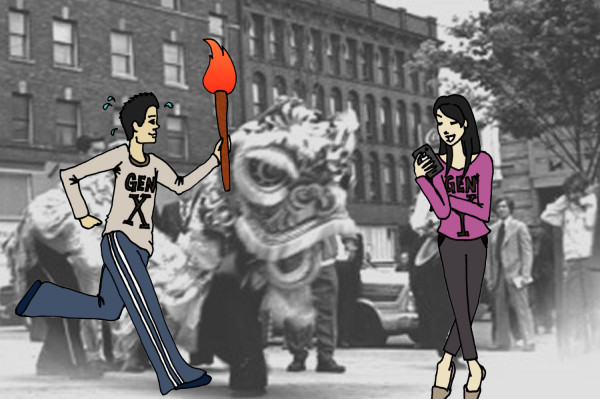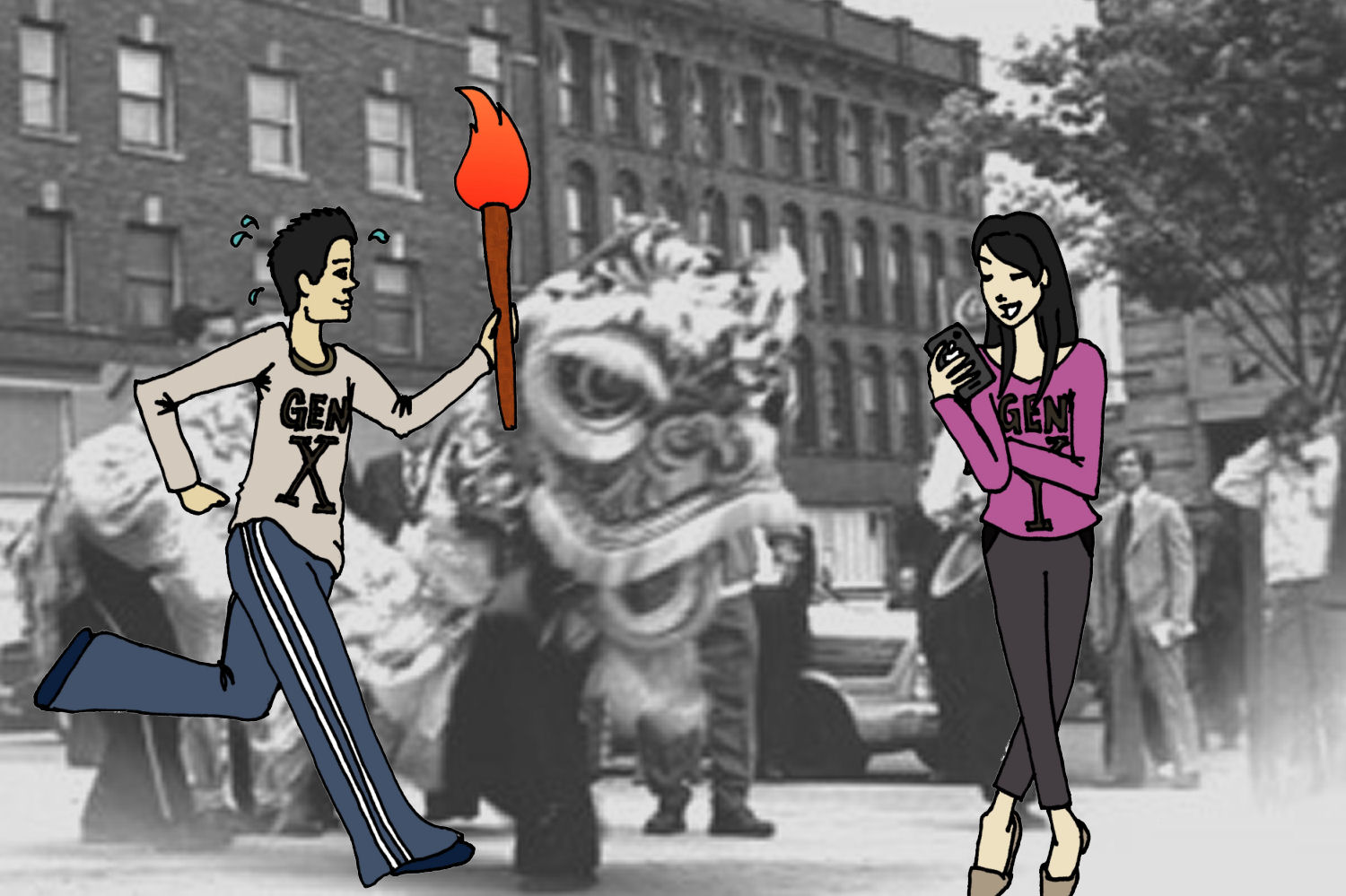
A while back, BigWoWo’s piece “Asian American Generational changes, and how the IR debate is a Generation-X thing” got me thinking about the gap between Asian Generation X-ers and Generation Y-ers, also known now as the Millennials. Specifically, I wondered about the two generations’ differing approaches to critical race issues (though overlooking the IR debate part that BWW’s article focused on).
Of course, every generation that is phasing out is wary of the incoming one. The APIA Baby Boomers felt that the Gen X-ers were losing their sense of Asian cultural identity and were assimilating too much into white America, and the Baby Boomers were probably right. Love or hate it, Joy Luck Club did a good job juxtaposing the two generations. Now that the Gen X-ers are all grown up, they’re eyeing the Gen Y-ers with skepticism. “These are the kids who will carry on our torch? Seriously?”
Let’s assume for the purpose of this post that you’re categorized as a Generation X-er if you were a young adult in the 1980s through 1990s. That means during this decade you were either in high school or college. We’ll categorize you as a Generation Y-er or Millennial if you were a young adult in the 2000s through now. Not a perfect categorization system, especially since those at the cusp of X and Y are going to be a confused bunch sharing traits from both generations. Let’s go with these definitions anyway. Also, please assume throughout that I’m speaking only of the university-educated middle class. The social experience of the other socioeconomic classes are an entirely different discussion altogether.
So sweeping broadly here, Gen X young adults–and I’m speaking about the Asian Americans– were more likely to be actively interested in Asian American social-political issues. These are the children/students tasked by their parents/teachers to carry out into action the ideologies from the Civil Rights movement that the generation before them fought and protested for. Also, the American Dream was still a personal aspiration. Gen X-ers still understood that they had to work hard to achieve their goals. They also seemed to give a greater damn about politics and philosophy, or engaged in an intentional, informed, and subversive repudiation of it.
Asian American Gen Xers also thrived in the Usenet forums and bulletin board systems. The day to day marginalization they felt as a minority in the real world could be explored comfortably in anonymity. They could seek out like-minded individuals and finally belong in the virtual, and they could have robust discussions about the Asian American experience. Asian American Studies was also in its formative stages, and so everything still felt fresh. Gen Xers, in a way, were pioneers.
Gen Yers, however, may be amused or even temporarily incited by APIA social-political concerns, but they don’t see it as their fight. I’ve observed that they really take the Western ideology of individualism and run with it. Then again, Asian American Studies isn’t fresh to them. If they wanted to, there’s quite a bit of precedent they can lean on, thanks to the preceding generations. For starters, there are books on Asian American history they can read.
That’s right, books! Gen Xers didn’t get to see much of themselves reflected in published pages. Ronald Takaki, Helen Zia, Jessica Hagedorn, many of the seminal oft-cited texts on the Asian American experience were published in the 1990s-2000s. So as silly as “well, they’ve got books to educate them on Asian Americanism” sounds, that simply was not the case before. For a long time, history books did not tell our story. Back then, the Chinese Exclusion Act was summed up in a paragraph and the Japanese Internment in a few pages. So Gen Xers had to write our narrative.
With the Internet what it is today, the Gen Y-ers have available any narrative, any history, any point of view or counter point of view they want to explore. They don’t have to locate the section of the library to search in via the Dewey Decimal System. They don’t even have to pop in a CD-ROM. For Millennials, the Asian American narrative is literally at their fingertips: on their smartphones.
Millennials also get to see Asian American faces in the media, another gain that generations past did not have. While these Millennials might not dismiss racism against Asians out of hand, they do somewhat dismiss the relevance of such racism to their own lives. Tony Lam’s documentary Vincent Who? is a compelling confrontation of how much our community has forgotten between Gen X and Gen Y. Around 2009 or so, college students were asked whether they knew Vincent Chin, to which they responded no. One said, “um, from the riots or something? um, a long time ago?” To another, the interviewer explained that Chin was a Chinese American who was murdered in 1982. The student replied back, “That was before I was born, so…”
Yet anyone who says one generation is lazier or more self-entitled than the other is wrong. In fact, both have produced remarkable APIA activists, but they’re different. Vincent Chin is not Gen Y’s fight, they don’t believe; Vincent Chin is their history. Gen Yers have taken on the activist mission of conveying to society that APIAs should be seen as individuals, not just one homogeneous blob of yellow people (and what’s more, we’re not all yellow). While Gen Xers would have probably loved to adopt such a mission themselves, they were still busy trying to just get that so-called homogeneous blob recognized.
One group, the Gen Xers, did not grow up seeing themselves reflected in the media. That glaring omission rendered their identities as APIA all the more relevant to them. They didn’t even get to the point of subculture; they were still stuck on culture. “Am I Asian or am I Asian American” was not yet a cliche. The other, the Gen Yers, especially the ones growing up in diverse major metropolises, are not so much focused on how they belong as the Asian American community, but on how they belong as individuals. As a result, they are granted a greater breadth for artistic exploration. They get to explore the subculture of being APIA.
The torch, dear Gen Xers, is getting passed on to qualified hands. Gen Yers aren’t on their smartphones ignoring your sprint. They’re on their phones tweeting about the great activist work you’ve done.








